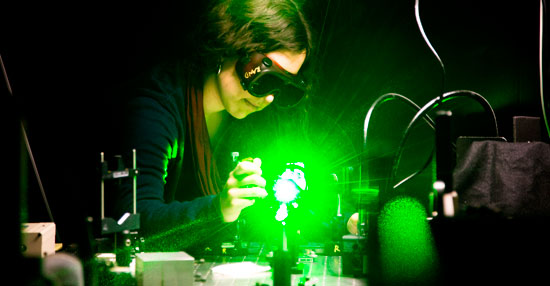Student Spotlight: Elizabeth Dreyer – Ambassador for Optics
Elizabeth’s research is to understand how a new interaction between light and matter can generate electricity.

 Enlarge
Enlarge
Elizabeth Cloos Dreyer
2nd year Ph.D. graduate student
Specialty: Optics
Advisor: Prof. Stephen Rand
Honors: NSF Graduate Research Fellowship; Rackham Merit Fellow
Elizabeth Dreyer wants to understand how a new interaction between light and matter can generate electricity. But when she’s not in the lab pursuing her research, she finds plenty to keep herself busy, as well as those around her.
Soon after arriving at Michigan, Elizabeth had an immediate impact in the ECE community by founding the joint student chapter of the Optical Society of America (OSA) and the International Society for Optics and Photonics (SPIE). “Extracurricular activities are my scheduled free-time,” Elizabeth said, “I just really enjoy being involved.” She also wanted to make sure the students at Michigan interacted with each other. Her world is optics, so that’s where she started.
Elizabeth is also an active member of the Society of Women Engineers (SWE), and has presented talks about her research at their national conference. She also participates in outreach programs such as Nano Days – a science camp sponsored by the National Nanotechnology Infrastructure Network at Michigan, where she spent a day teaching 50 grade school students about optics using experiments with Jell-o and laser pointers.
Elizabeth received her bachelor’s degree in electrical engineering with a concentration in photonics from Michigan Technological University, but came to Michigan still undecided about what to focus on here.
After an in-depth analysis involving spreadsheets and a decision matrix, Elizabeth concluded that she wanted to be an experimentalist in non-linear optics. She introduced herself to Prof. Stephen Rand at the Engineering Graduate Symposium because she found his paradigm shifting theory for harvesting electricity from light compelling. Elizabeth is now thrilled to be researching the theory’s feasibility.
Elizabeth’s research is to understand how a new interaction between light and matter can generate electricity. Prof. Rand had already discovered that when light interacts with matter, its magnetic and electrical properties work in tandem to displace electrons. Bascially, when light is switched on and off, it forces electrons to oscillate back and forth creating an electrical current. Elizabeth is testing a variety of liquids and solids in order to quantify the ratios of magneto-electric scattering in each under varying laser intensities.
In addition to her research, outreach and community involvement, Elizabeth is pursuing a certificate in Science Technology and Public Policy from the Ford School. She is certainly a figure to watch as a possible future ambassador for the popularization of science and science education. During our interview, she taught us a bit about optics, complete with a demonstration. She just can’t help herself.
We asked Elizabeth what advice she might have for other graduate students, even though she’s only in her second year. She says:
“Find out what makes you happy. Research is important, but so is your advisor and your community. The research will get difficult, but if you have other things that make you happy, you can stick it out. Life is short – be happy.”
 MENU
MENU 
